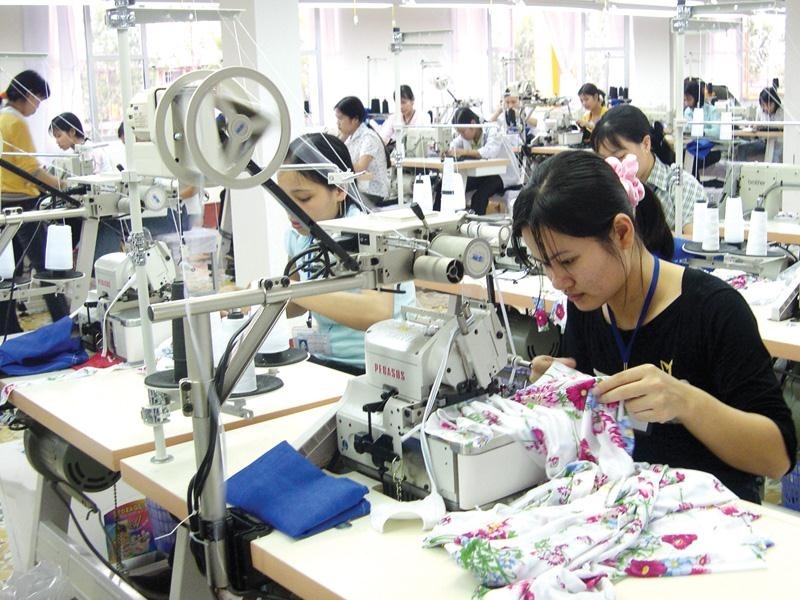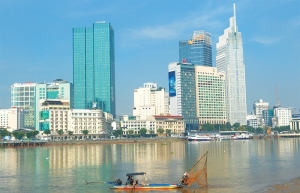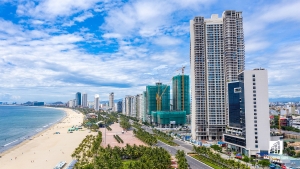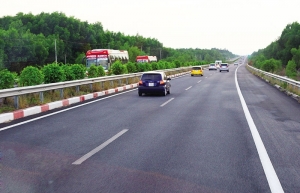High interest rates compound business woes
Ho Chi Minh City-based Binh Thanh Import-Export Production and Trade JSC (Gilimex) saw its net revenue take a dip of 81 per cent in the fourth quarter (Q4) last year, falling to nearly $11.4 million compared to $60.8 million on-year. Its post-tax profit shed 92 per cent in the same period.
 |
Similarly, state-owned Vietnam National Textile and Garment Group (Vinatex) saw its Q4 net revenue fall by 15 per cent on-year to just over $180.6 million.
Vinatex’s Q4 financial expenses doubled to surpass $8.34 million, while profit from joint ventures and association activities fell 19 per cent to $8.3 million.
Rising costs eroded the company’s profit last quarter as Vinatex incurred nearly $21,740 in losses, which was the first quarter the company saw losses since being equitised in 2014.
| Business in other sectors away from textiles and apparel are facing a similar situation in the face of reduced revenue and profit amid soaring financial expenses. |
Vinatex management attributed the poor results to effects from China’s COVID-19 policy, resulting in dwindling demand in several markets.
Business in other sectors away from textiles and apparel are facing a similar situation in the face of reduced revenue and profit amid soaring financial expenses.
Dang Ngoc Quy, director of fruit traders Tam Nguyen, said the company has received many orders from partners in Asia and Europe, but expansion plans to boost production capacity face delays due to capital distress.
“Before Lunar New Year, our lender encouraged us to finalise the loan contracts and take back collateral to make procedures for further loans. However, these new procedures were not approved in the end,” said Quy, adding that many firms in Ho Chi Minh City and other localities have encountered the same situation.
“If such a lack of available capital continues for several more months, many firms will not be able to sustain operations,” Quy said.
Many businesses have been using loans to increase capacity, so much so that the spiking interest rate has significantly scaled up financial expenses, adversely affecting day-to-day business. Last year, businesses taking out dollar loans incurred the dual effects of exchange rate and interest rate volatility.
Although the recent interest rate increase has slowed, it is still quite high, and the likely increase in energy costs and other expenses are further expected to eat into profit.
Nguyen Ngoc Hoa, chairman of the Ho Chi Minh City Union of Business Associations, has proposed banks should show more sympathy to the business community in the current difficult circumstances.
“It is important to have in place clear solutions as well as a viable roadmap to bring down the interest rate in the next six months in order to boost investment activities. With the current long-term interest rate beyond 10 per cent per annum, it is almost impossible for businesses to maintain efficient operations,” said Hoa.
 | Wheels in motion to resolve impediments in real estate After a period of sluggishness over the last couple of years, the real estate market has not yet rebounded as anticipated and has even shown symptoms of a standstill due to legal concerns. |
 | Vietnam's coastal real estate market woos investors Vietnam has considerable potential in its coastal real estate market, experts assured at the Coastal Appeal seminar held by VIR in Ho Chi Minh City. |
 | New decree aims to get rid of PPP impediments Vietnam’s newly issued Decree No. 63/2018/ND-CP on investment in the form of public-private partnership is expected to take effect on June 19, 2018 as part of the government’s efforts to address the existing obstacles to making infrastructure projects in various sectors more appealing to investors. |
What the stars mean:
★ Poor ★ ★ Promising ★★★ Good ★★★★ Very good ★★★★★ Exceptional
Related Contents
Latest News
More News
- Masan Consumer names new deputy CEO to drive foods and beverages growth (February 23, 2026 | 20:52)
- Myriad risks ahead, but ones Vietnam can confront (February 20, 2026 | 15:02)
- Vietnam making the leap into AI and semiconductors (February 20, 2026 | 09:37)
- Funding must be activated for semiconductor success (February 20, 2026 | 09:20)
- Resilience as new benchmark for smarter infrastructure (February 19, 2026 | 20:35)
- A golden time to shine within ASEAN (February 19, 2026 | 20:22)
- Vietnam’s pivotal year for advancing sustainability (February 19, 2026 | 08:44)
- Strengthening the core role of industry and trade (February 19, 2026 | 08:35)
- Future orientations for healthcare improvements (February 19, 2026 | 08:29)
- Infrastructure orientations suitable for a new chapter (February 19, 2026 | 08:15)

 Tag:
Tag:

























 Mobile Version
Mobile Version